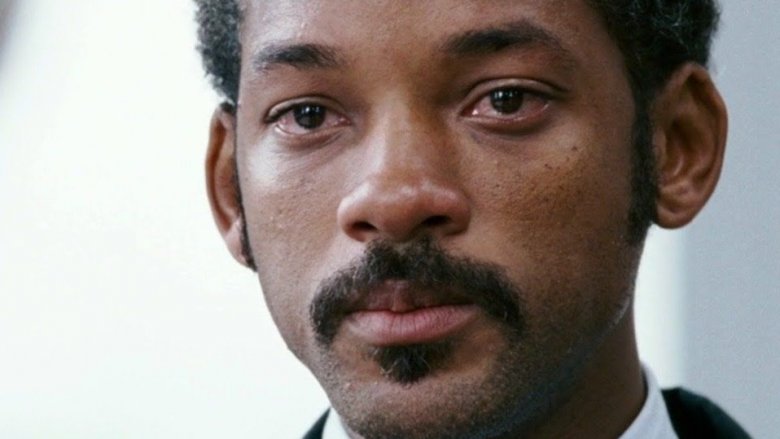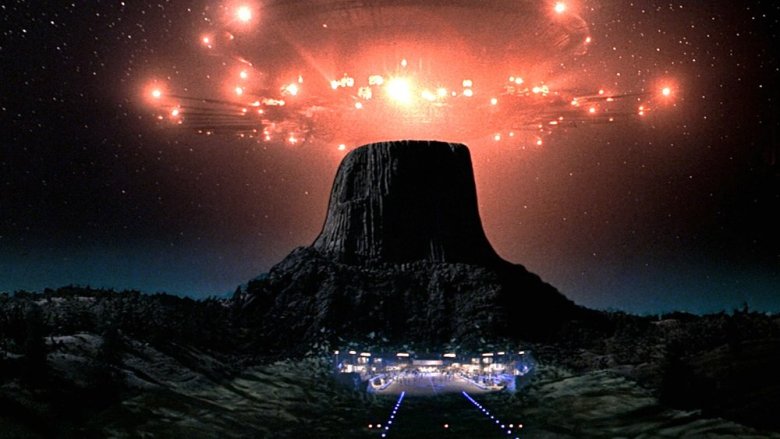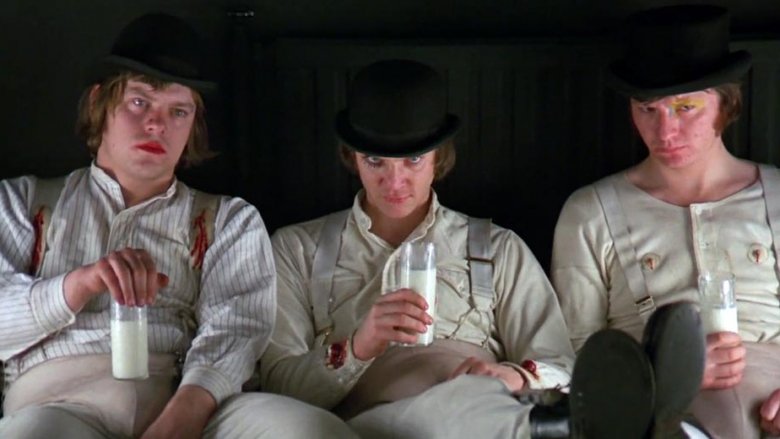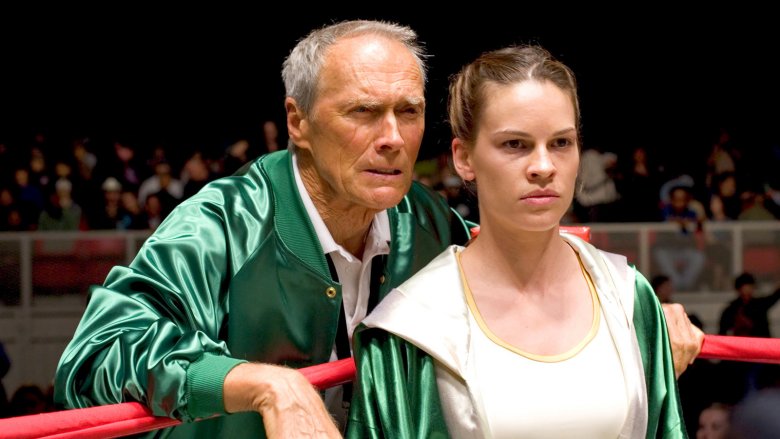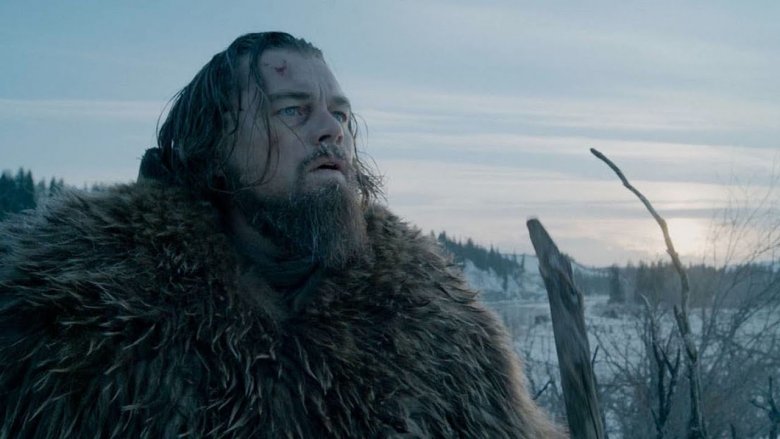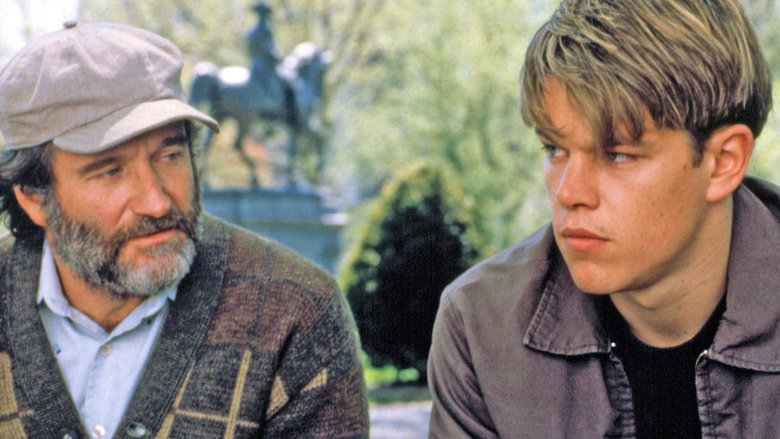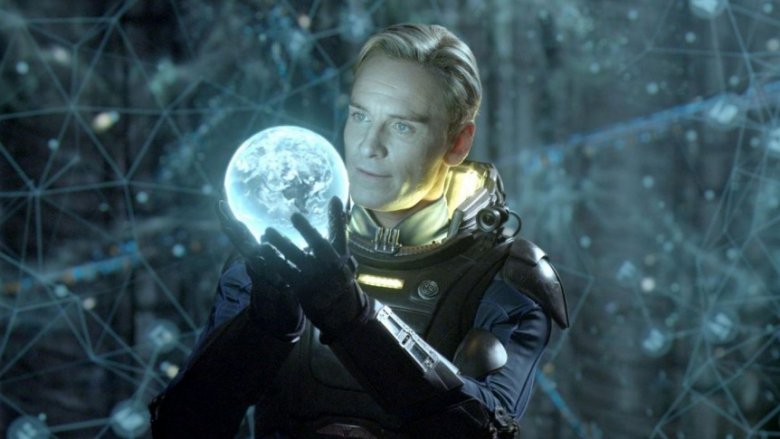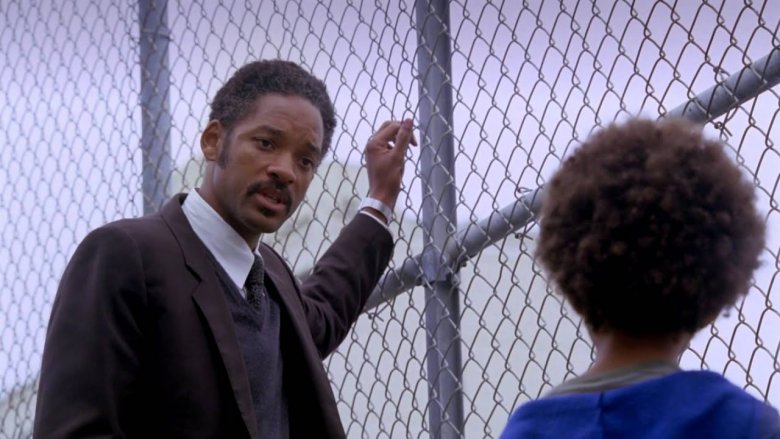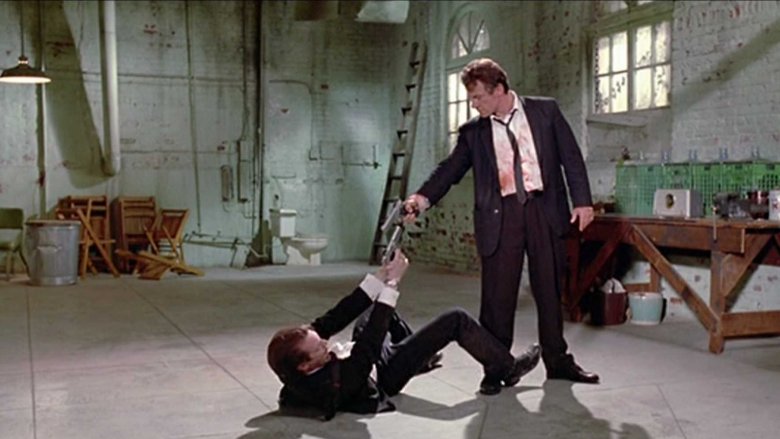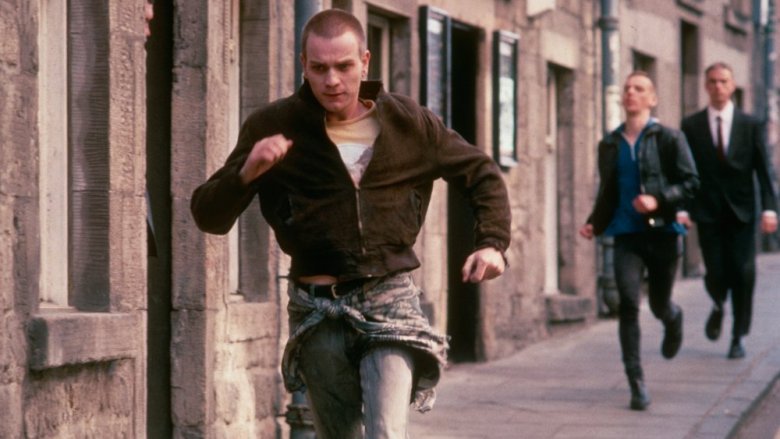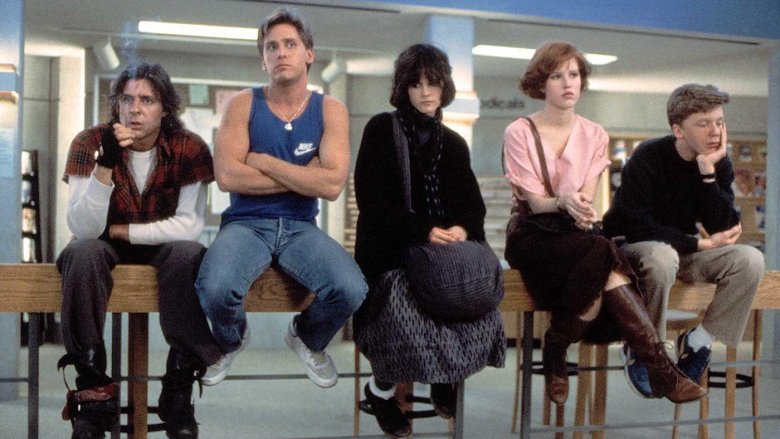The Real Meaning Behind These Movie Titles
A movie title paints a picture worth a thousand words. Seriously, the name of a movie should sum up everything you need to know about a film. Just think about titles like Murder on the Orient Express, The Exorcism of Emily Rose, or Mega Python vs. Gatoroid. With titles like those, moviegoers know exactly what they're going to get before they even settle in with their popcorn.
There are other movies, however, where the titles aren't so clear cut. Whether it's a single word or an entire sentence, these films come with names that are subtle references or have deep meaning. They might be an inside joke between producers, or perhaps they're a callback to a little-known historical event. We're not here to judge a film by its name, but instead, we're shedding light on the real meaning behind these movie titles. (And don't worry, they're all better than Mega Python vs. Gatoroid.)
The title of mother! gave birth to the movie
When it first hit theaters, no one seemed to know what Darren Aronfosky's mother! (all lower case and exclamation point) was about. The film has ambiguously named characters, with Jennifer Lawrence starring as Mother and Javier Bardem as Him. What first appears to be a domestic struggle is actually a retelling of the Biblical creation story, with Him as God and Mother as the Earth, a woman who's constantly hurt and betrayed by Him's number one fans: mankind.
In telling the story of Mother Earth, the title makes sense, but why is it so stylized? According to an interview with Entertainment Weekly, Aronofsky wrote the title before anything else. "The very first thing I wrote," he said, "before I started on the script, were the six letters of 'mother,' and then I paused for a second. I remember this so clearly: I pressed 'shift-1' and put the exclamation point. That title was there before I wrote a word." He further clarified in an interview with The Telegraph that the exclamation point was a reflection of the film itself. "The film kind of has an exclamation point," Aronofsky explained. "At the end of it, there's a big exclamation point. So I think the title was just a bit better that way."
Steven Spielberg did his research for Close Encounters of the Third Kind
Close Encounters of the Third Kind is one of the greatest sci-fi movies ever made, and it's one of Steven Spielberg's very best movies. This 1977 film centers around several encounters with unidentified flying objects, and it ends with one of the most breathtaking final scenes in cinematic history, when a bunch of scientists and little grey men put on an intergalactic concert. However, while the movie touched audiences across the globe, not everyone watching was steeped in UFO lore, so quite a few moviegoers were left wondering what was up with the title.
After all, why not just call the film Close Encounters? Well, as it turns out, there are several kinds of close encounters with alien life, and they are ranked and rated on the Hynek Scale. The Hynek Scale was developed by astrophysicist and UFO researcher J. Allen Hynek in his 1972 book, The UFO Experience: A Scientific Inquiry. According to Hynek, close encounters of the first kind include up-close sightings of UFOs, while encounters of the second kind are distinguished by physical evidence, a la crop circles or cow mutilations. And finally, close encounters of the third kind are when human beings actually see a genuine alien. And since the film ends with an interspecies meet and greet, it's only fitting that Spielberg's movie would borrow from Hynek's book.
We are the clockwork oranges in A Clockwork Orange
A Clockwork Orange is so strange, so disturbing, so "ultra-violent" that the weird title might be the last thing audiences think about. Stanley Kubrick's film adaptation of the 1962 novel follows a young Malcolm McDowell as Alex DeLarge, a thug who loves posh hats, Beethoven, and rape and battery. After a spree of horrible crimes set to show tunes, Alex is caught and "cured" of his penchant for crime via a controversial psychological therapy, and this is where the "clockwork orange" comes in.
Anthony Burgess, the author of the original book, first heard the phrase "as queer as a clockwork orange" in a London pub and then added some of his own meaning to it. According to Burgess, a clockwork orange is a living organism controlled by a higher power. Going even further, in the novel, the elderly author attacked by Alex and his goons is actually writing a book called A Clockwork Orange, which is a criticism of authoritarian governments that uses "laws and conditions" to turn humans into a "mechanical creation." Kubrick's film definitely has the same rebellious vibe, and the director himself described the movie as a social satire examining the psychological control used by totalitarian governments. However, we have no idea what Kubrick and Burgess thought about actual oranges.
Million Dollar Baby is referencing a song
Directed by Clint Eastwood, Million Dollar Baby is the Oscar-winning tale of a grumpy, old boxing trainer Frankie Dunn (Eastwood) who takes on waitress-turned-prizefighter Maggie Fitzgerald (Hilary Swank), a hillbilly who's natural at knocking people out. This underdog story isn't for the faint of heart, and while it features a pretty devastating ending, its title definitely deserves more attention because there's a whole lot happening in that name.
The million dollars in the title can refer to the million dollar fight in Vegas that winds up costing Maggie, and by extension Frankie, everything. And of course, it's referring to the relationship between Frankie and Maggie. The two develop a sort of father-daughter bond, and in that way, Maggie is Frankie's "million dollar baby," because he cares about her so much. However, the title is also probably a reference to a song that connects deeply to the plot. The 1931 tune by Henry Warren features the telling lyrics, "I found a million dollar baby in a five and ten-cent store." It's a line about finding something valuable in a cheap place, kind of like how Frankie found Maggie in his dingy old gym.
The real meaning of The Revenant refers to the undead
Don't eat too much popcorn before watching The Revenant. That scene with the bear can be a little nauseating ... and so can that scene with the bison ... and that scene with the horse. Honestly, the whole movie is insanely intense, and crazier still, it's inspired by a true story. Leonardo DiCaprio plays Hugh Glass, a trapper who's left for dead after encountering an angry grizzly, and his incredible tale of survival is what earns him the name of a "revenant." As it turns out, that's a fancy, old-fashioned way of saying "zombie."
It comes from the French word "revenir," which means "to return." And that's exactly what the whole movie is about, as Glass literally crawls out of his grave and returns to get revenge against the man who left him for dead and killed his son. Although Glass technically never stopped breathing, he was ripped to pieces, left to freeze, and attacked multiple times, but the undead mountain man manages to make his way across thousands of miles. Perhaps DiCaprio's character explained it best when he said, "I ain't afraid to die anymore. I done it already."
The title for Good Will Hunting was almost a little bit different
Will Hunting is a good boy. Sure, he gets into fights, but he's "wicked smart" and usually means well. However, this isn't exactly the true meaning that Matt Damon and Ben Affleck put behind the title of their critically-acclaimed, Oscar-winning film, Good Will Hunting. In fact, the titular character very nearly wasn't named Will at all. Good Nate Hunting just doesn't have the same ring, but according to Affleck, Damon originally wanted the main character to have the name "Nate."
"I never liked the name Nate," Affleck said in an interview with Boston Magazine, "but we didn't have another name, and I just thought like, 'We'll cross that bridge when we come to it.' And when it came down to selling the movie, we still didn't have a title." However, they found their perfect title in a screenplay written by a friend from high school, Derrick Bridgeman. Bridgeman's Good Will Hunting was an entirely different story, but Affleck and Damon liked the title so much that they offered their old pal $10,000 for the name. So Bridgeman agreed, got a part in the film, and the rest is history.
Prometheus has a mythological meaning
Ridley Scott is pretty famous for his titles that get straight to the point. Alien is about an alien. Blade Runner is about a blade runner. And Gladiator is about, you guessed it, a gladiator. So what's up with Prometheus if the Greek mythological hero was nowhere to be found in the sci-fi thriller? Well, if you want to get technical, the ship carrying all our doomed character is called the Prometheus, but we can dig a whole lot deeper into the meaning of that title.
Prometheus was the Greek mythological hero who stole fire (which could be construed as knowledge) from the gods and brought it to man. In the film, the crew is on a scientific expedition to find out where humans first came from. The CEO of the infamous Weyland-Yutani company himself wants to look our creators, the Engineers, in the face and ask "why?" The Engineers and their DNA were indeed the "fire" of mankind, but just like the famous hero of lore, things don't turn out so well for the scientists hoping to learn a little bit more about the universe.
Being in the war is being in The Hurt Locker
War is hell. That's made abundantly clear by the death, destruction, and high tension in Kathryn Bigelow's The Hurt Locker, and this gripping drama about the dangers of defusing bombs more than earns its title. Based on the firsthand accounts of journalist Mark Boal, who spent time with a bomb squad deployed in Iraq, the production went for absolute authenticity. While filming in Jordan, the actors worse bomb disposal suits that were boiling hot, and everybody had to deal with the 125 degree temperatures of the desert. The cast and crew were indeed in the hurt locker.
So what exactly does that term mean? Well, "the hurt locker" is military slang for being in pain or discomfort, with a history going back to the Vietnam War. In fact, during the Iraq War, soldiers often said that explosions would send those caught in the crossfire to the hurt locker. So yeah, there's no actual locker or combination, just pain.
The tile for The Pursuit of Happyness is misspelled on purpose
The 2006 film The Pursuit of Happyness is based on the memoirs of the real Chris Gardner, a man who seriously went from rags to riches. Of course, there's not a whole lot of happiness in the film. Played by the ever-emotive Will Smith, Gardner faces all sorts of obstacles on the streets and in the office as he competes for a full-time position as a stockbroker, all while taking care of his son and trying to hide the fact that he's homeless.
However, pay attention to the title, and you'll notice a typo — "happiness" is spelled "happyness." So what's up with that? Well, the famous misspelling also shows up in the movie itself, painted on the wall of Chris Jr.'s (Jaden Smith) daycare center. But there's a deeper meaning for Gardner in this particular way of spelling the word. During an interview, Gardner explained that he saw the "Y" as a way to denote individual happiness. In other words, what makes one person happy might not illicit the same feeling in their neighbor. And as for Gardner, yeah, he's pretty happy these days.
Reservoir Dogs is all thanks to miscommunication
Quentin Tarantino's films usually have fairly straightforward titles. Kill Bill tells the story of killing Bill, The Hateful Eight has eight hateful outlaws, and Django Unchained is about Django getting unchained from slavery. But Reservoir Dogs? The meaning behind the classic heist movie's title doesn't fit so neatly. There are no reservoirs and no dogs anywhere in sight, just a whole lot of critical acclaim. The nonlinear film tells the story of the fallout after a diamond heist goes wrong, and it quickly gathered attention for its unique script filled with violence, profanity, and Tarantino's magic touch. And that's not too bad considering that, at the time, Tarantino was just a no-name dude who worked at a video store. While he was earning his paychecks at the legendary Video Archives, Tarantino would suggest obscure, interesting movies to customers. And according to Hollywood legend, he found the name for his crime thriller when, upon recommending the 1987 film Au Revoir les Enfants, a customer replied, "I don't want to see no reservoir dogs."
Trainspotting is about drugs, not trains
While there is a train or two in the 1996 film Trainspotting, they're certainly not central to the plot. The actual story is a roller coaster of the highs and perils of heroin addiction, and the movie follows a group of friends in Edinburgh who spend their time clubbing, overdosing, and failing to get clean. Because of the funny, kooky trailers with upbeat music, the film was embroiled in controversy, with many wondering if Trainspotting glorified drug use. It most certainly doesn't, and in fact, many people didn't realize that even the title itself is a reference to heroin use.
Renton, Sick Boy, Spud, and Begbie aren't on the lookout for trains. Rather, the term refers to the "track marks" left by heroin use in the veins on users' arms. Users will look for spots with the least amount of these dark track marks because there's less discomfort and risk of infection. Plus, there's the fact that heroin hits like a speeding locomotive. The film, originally a book by Irvine Welsh, quickly became a favorite of British moviegoers, even if they left the theater wondering where all the trains were.
The Breakfast Club's title is an inside joke
The Breakfast Club is such a classic movie that we've long stopped questioning the title, despite the fact that it's not actually a film about friends getting together to have breakfast. In fact, the main characters aren't even in a club, and there are no bacon and eggs anywhere. It's just detention, heartfelt confessions, and an iconic soundtrack. But much like the famously ad-libbed dialogue throughout the film that adds a feeling of authenticity, the title is also ultra-authentic in its own unique way.
As it turns out, director John Hughes chose the movie's unusual name because of an inside joke. According to costume designer Marilyn Vance, Hughes had a friend who'd called his detention "the breakfast club." And when the director heard about that, voila, a classic movie title was born. And we all owe a debt of gratitude to his friend, because Hughes originally intended on calling the movie The Lunch Bunch.
